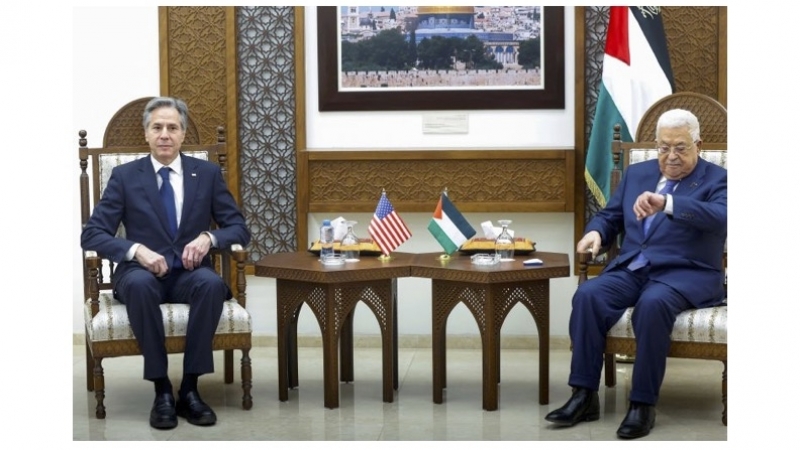



Mahmoud Abbas, the US-zionist puppet in Palestine has little choice but to carry out the orders given to him by masters. While claiming to be ‘president’ of Palestine, he betrays his own people.
Mahmoud Abbas whose shelf-life has expired, continues to survive by trying to promote US-zionist interests against the wishes of the Palestinian people. His latest admission that he is helping Israel find three missing Jewish students has done nothing to improve his jaded image among Palestinians that continue to suffer zionist brutalities on a daily basis.
Given the straightjacket in which Abbas and his disgraced cohorts operate, not only is it entirely unlikely for him to defy Israeli Prime Minister Benjamin Netanyahu, but it is hard to imagine he possesses any courage to defy his paymasters.
The Palestinian issue has been virtually stalemated since before Israel’s war on Gaza in 2008–2009, with Hamas, the most popular and legitimate Palestinian leadership bottled up in the besieged and densely populated Gaza, and the West Bank under the increasingly repressive rule of Mahmood Abbas’s Palestinian Authority (PA).
Almost until the expensive limousines carrying senior Fatah members began converging on Bethlehem on August 3 and 4, it had been unclear whether the convention would go ahead...
Asked about the lesson of fasting, Imam Husain (r.a.) is reported to have replied that “the rich should feel the pangs of hunger and appreciate what the poor have to endure, and therefore share Allah’s bounty with them.”As Muslims begin the month of Ramadan later this month, they should think of the suffering of their brothers and sisters in Palestine, and Ghazzah in particular.
Months of increasing tension between the Fatah and Hamas movements in Palestine came to a head on June 14, when Hamas militias captured Fatah-controlled institutions in Ghazzah that had refused to accept the authority of the Hamas government of prime minister Ismail Haniya. Palestinian president Mahmoud Abbas responded by dismissing the Haniya government and appointing a new administration, under Salam Fayyad, in Ramallah, in the West Bank.
Last month’s developments in Palestine are no great surprise. Basically, we have seen a political coup by an established, pro-Western political elite against a popular Islamic movement that was growing in power and credibility, and threatened to take a Muslim people and country in a direction unacceptable to Washington and Tel Aviv. The fact that this particular coup has taken place in the particular circumstances of zionist-occupied Palestine, rather than in one of the many Muslim nation-states where similar events have occurred, should not distract from that fundamental reality
For a few tense days in December, after the attempted assassination of Hamas prime minister Ismail Haniyeh as he re-entered Ghazzah at the Rafah border crossing, apparently perpetrated by gunmen associated with the Fatah movement led by Palestinian president Mahmoud Abbas, it appeared that Palestine might slide into civil war. As so often in the past, the Palestinians drew back from the brink, knowing that the slightest slip would play into the hands of their enemies.
One feature of the massive political pressure on Hamas, the leading Islamic movement and the most popular political force in Palestine, since it was elected to power earlier this year, has been the increasingly open enmity of both secular Palestinian forces, particularly the Fatah movement led by Palestinian “president” Mahmud Abbas, and of Arab rulers.
Any illusion that Mahmoud Abbas may have had about being the elected leader of the Palestinian people in their struggle for the establishment of an independent, sovereign state in at least a part of their historical homeland must surely have been shattered on June 21.
Officials of the new Palestinian administration under Mahmood Abbas, elected president in flawed elections on January 9, claimed success on January 24, when Hamas, Palestine’s main Islamic movement and leading militant resistance group, reiterated its willingness to suspend military operations provided Israel do the same.
It is perhaps ironic that a part of the heart of the Muslim world that has been under western occupation for over half-a-century should have some of the most vibrant politics in the modernMiddle East. For the west, the presidential elections in the area of Palestinian autonomy was proof of their commitment to bringing democratization to the Muslim world.
In a region that is crying out for political change, two key countries are beginning 2005 with elections. Palestinians elected a new president on January 9, while Iraqis are due to elect a National Assembly on January 30 (after Crescent goes to press).
Israeli prime minister Ariel Sharon became a champion for peace on May 25, when he persuaded his cabinet to accept the US’s ‘roadmap’ for peace.

